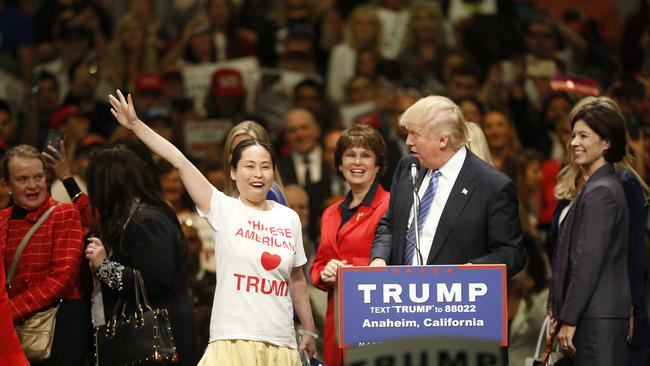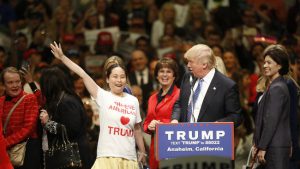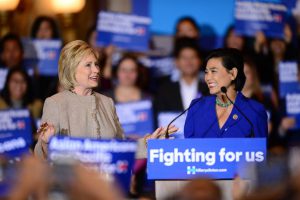Photo Credits: NBC News and LA Times
By Hudson Leung (MPA/MBA Tuck, 2019) and Wilson Tong (MPA/MBA Wharton, 2018)
It was 5:30AM on Election Day, and we were both awake and energized, with just a few hours to go before we could cap a long season of campaigning.
One of us (Hudson) was preparing to conduct poll watching and exit polling in Boston’s Chinatown, and the other (Wilson) was heading to the airport to catch a flight back to Philadelphia to vote in his hometown.
It turned out to be a very long Election Day (and Night), with enduring physical and emotional drain—an experience shared by millions of Americans and people across the world who are processing Donald Trump’s victory.
To us, as active volunteers for Hillary Clinton in New Hampshire throughout this election cycle, it was clear the race would be tight. A Donald Trump victory was certainly within the realm of possibility.
However, what surprised us most about the election was how some naturalized (first-generation) Asian immigrants—Asians of our parents, aunts, and uncles’ generation—appeared to vote: Donald Trump for President. Although Hillary Clinton overwhelmingly won the support of Asian Americans, especially those who are second-generation (e.g., born in the U.S.), we were, and remain, troubled by the generational divide.
There were many potential issues at play, including health care, taxes, and racism—but Donald Trump’s strong message on immigration has repeatedly been highlighted as a key factor influencing older Asian voters.
Older Asian voter support for anti-immigration stances is somewhat ironic, as some were the key beneficiaries of America’s refugee policies and the history of America’s immigration laws is particularly harsh against persons of Chinese and other Asian nationalities. In fact, when recently asked about Japanese internment camps, President-elect Trump was frighteningly vague.
As second-generation Asian Americans who are active in politics, we understand and appreciate the importance of political diversity within the Asian American community, but it is challenging to fully grasp how many first-generation Asian Americans—who are often viewed as being “perpetual foreigners” and not American—could support someone who openly mocks Asian-language accents and inflames the worst of racism and xenophobia in our country. What makes first-generation Asian Americans, regardless of political affiliation, think they aren’t the next targets of racism and xenophobia?
Despite our frustrations that some of our fellow Asian Americans may be voting against our shared interests, a worse outcome of election would be a retrenchment towards political apathy. Given the post-election uptick in racially-motivated violence against minorities, first-generation voters may well decide that politics in the U.S. is broken and dangerous—as it is in many of their countries of origin. However, as students here at Harvard Kennedy School, we know that all Americans—hyphenated and otherwise—can only protect ourselves from oppression by engaging with, not retreating from, the political process.
After the initial meeting between President Obama and President-elect Trump, President Obama stated: “If Donald Trump succeeds, America succeeds.” Only time can truly tell whether Asian Americans will succeed under a Trump administration, but there is no reason we should leave that outcome up to fate. In recent days, we have asked ourselves what we failed to understand about Trump voters and what we need to do to protect our rights in the coming years. For Asian Americans, the answer to both questions may begin with some tough and frank conversations back home.


